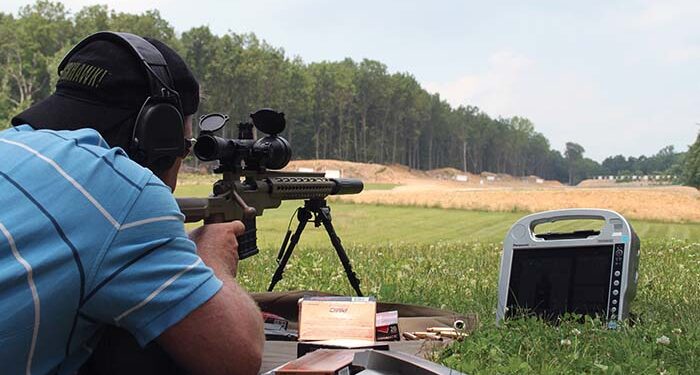By Todd Burgreen
The shooter is lying prone preparing to engage an 800 yard target. He is waiting patiently for wind conditions to settle into a desired known pattern. He fires a round and works the action. He shifts his glance over to a computer screen to his right without losing his cheekweld.
He then proceeds to send another round downrange within a few seconds of the first round and then another maximizing existing wind conditions. The marksman is impressed with the Oakwood Controls H-Bar LOMAH (Location of Miss and Hit) target system. This is because he did not have to wait for the target to be pulled and marked. This would have not only have required someone in the pits, but perhaps had allowed for the wind to shift as well as forcing him to shift off the rifle to peer through a spotting scope to ascertain results. In fact, he was at a private range with no one else around. Without the Oakwood Controls H-Bar target system he would have fired a group and then either walked or driver down to look at his results wasting precious training time.
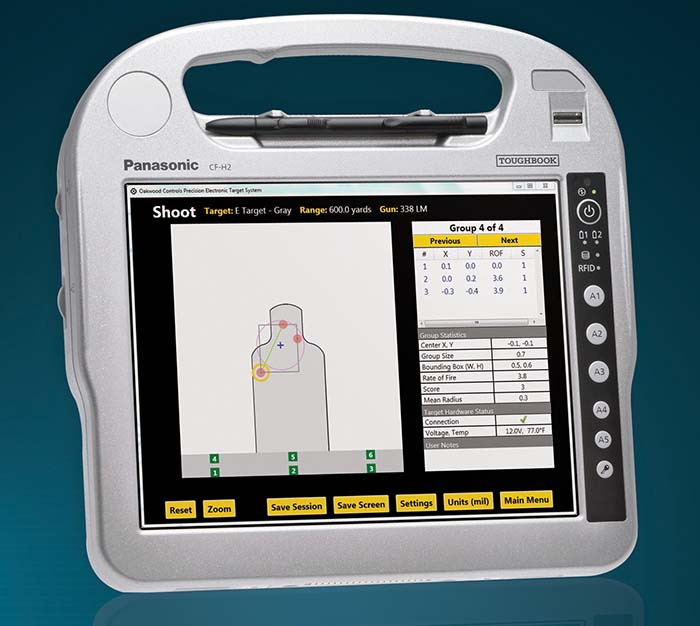
Oakwood Controls H-Bar LOMAH is a mobile target system weighing in at 15 pounds. The Oakwood system detects and locates shots via a combination of acoustic, temperature and electronic sensors with an accuracy levels of +/- 5 mm throughout the scoring area. The system is capable of detecting both hits and misses and is designed to work both on stationary and moving targets. The only caveat is that bullets need to maintain supersonic velocities for detection. The trajectory of the round registers through supersonic shockwave. Multiple sensors are arranged in different patterns, depending on the targeting application. When a bullet generating a supersonic shockwave passes over the sensors, each sensor trips a timer. That information is sent to a master target station which forwards the information to the shot processing computer. The position of each shot is then displayed on a computer next to the shooter. This is all done quicker than it takes to ready the description. Group sizes can be tracked in inches, centimeters, MOA, and/or MIL along with rate of fire, bounding box data, location on target and mean radius. If other types of tracking/scoring are needed, Oakwood can easily accommodate thanks to their experience in programming and software engineering. Due to its mobile nature the H-Bar is powered by rechargeable batteries featuring six hour run time. If set up in a more permanent format, buried 12V cabling can be used if a user finds this more convenient.
John Huang initially started Oakwood Controls in 2008 with an emphasis on software engineering and sensor integration for the military.
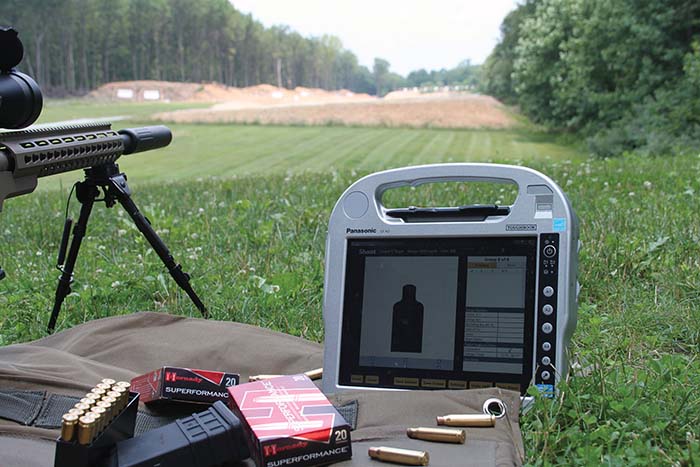
However, another endeavor had been on John’s mind since 2003 with his arrival in central Pennsylvania. This was inspired by a private war on ground hogs inhabiting his property along with a constant escalation of caliber and range as the grounds hogs were culled further and further away from home; a credit to John’s marksmanship. The accuracy bug had bitten John in a big way. His brother in law was a frequent participant in John’s ground hog campaign. Eventually, ranges extended out to 600+ yards, thus requiring long range perfection. With John’s brother in law in a wheel chair, he was the target distributor and puller at training/practice sessions. John’s move out of the country for awhile on a business endeavor curtailed his brother in law’s shooting activities. John inquired about European electronic target systems with intent to purchase one for his personal use. None appeared interested in selling a single unit to an individual.
Upon John’s return to the US he created an electronic target tracking system prototype based around acoustical sensors detecting bullet path. He proofed this at a local range where positive comments poured in. A trip to SHOT SHOW reaffirmed he was onto something worth further exploration by the interest generated. Special operation units and firearms manufacturers were early customers of Oakwood Controls’ target systems. Each consumer appreciated the efficiency, time savings, portability, simplicity and digital record generated from the Oakwood Controls target systems.
In 2009 Oakwood Control’s first target system was introduced. Oakwood target tracking products now consists of the Precision Box Target System, Quality Assurance System, Ballistic Coefficient Measurement System and the most recently the H-Bar mentioned earlier in the article.
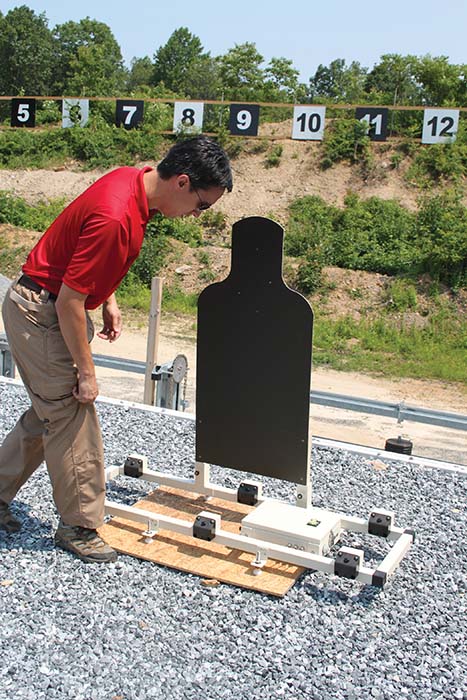
The software, sensors, software and programming integration is impressive with the Oakwood system and frankly over most of our heads. Acoustical sensors combine with signal processing electronics at the Oakwood Shooting Station computer interface. The system processes millions of acoustic samples per second making shot placement accuracy indistinguishable from punching paper. The electronics are manufactured to mil spec requirements with NEMA 4X enclosure rating around sensitive components. Any entity or individual that has a chance to experience the Oakwood Control’s different target systems will be a convert based on simplicity of use and instant feedback of rounds on target no matter ranges involved.
Oakwood did not forget its initial inspiration with target systems still included in their product line up for civilians/individuals. Where as the Oakwood Precision Box target is intended more for competitive shooting venues, private gun clubs, and commercial ranges due to its more permanent aluminum target frame configuration, the H-Bar target is more portable and making it conducive to random placement in the field or other scenarios. No matter the particular Oakwood target system, Oakwood Controls’ electronic nearly instantaneous feedback of shot placement eliminates the need for staff/personnel to operate in the pits or travel down range to view shot placement on paper targets. The elimination of having to go down range has the ancillary benefit of increasing safety by not having personnel going forward of the firing line as frequently. This, rightfully so, is a major concern of any gun club or range establishment. All of this makes for an efficient operating environment by streamlining the feedback process of engaging distant targets so that the learning curve of long range training is maximized. Oakwood’s owner John Huang tells anecdotal stories of SOCOM personnel commenting of how much more efficient their training evolutions have become by the instant digitally catalogued feedback offered by Oakwood Controls target systems.
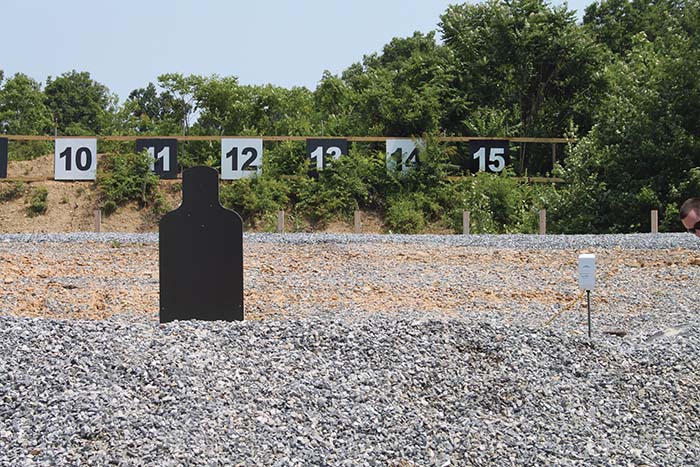
Two separate range sessions using the H-Bar, one in Virginia (VA) and the other in Pennsylvania (PA), left no doubt of its capabilities. The ride to and from the 600 yard berm took almost as long the H-Bar’s set up. Oakwood advertises 20 minutes for set up time; probably takes less after only a few times doing it. The aluminum frame is set on the ground and leveled. Target stanchions are then inserted with target silhouette attached between them. A wireless data transmitter is placed well to the side of the H-Bar for protection from incoming rounds. This data transmitter is set up with a direct line of sight back to the access point at firing line that feeds information to the laptop interface; all of this done via wi-fi not requiring hard wire connections. Some care and forethought must be given to protect the aluminum frame and software box that lies near ground level. At the VA range session, armor plate and railroad timbers were placed around the H-Bar. The PA test session took place at a private range allowing for the H-Bar to be placed behind a berm with only the cardboard target visible by protruding above.
Do not let the Oakwood H-Bar LOMAH Target’s mobility mislead about its ability to stay in place afield for extended amounts of time. Though easy to do, the H-Bar does not have to be dismantled after every range session. It can be left in place without concern of damage or deterioration. The Oakwood H-Bar is not confined to recording only hits on target. It can provide feedback up to a few feet off target of misses. This is an important nuance not offered by paper.
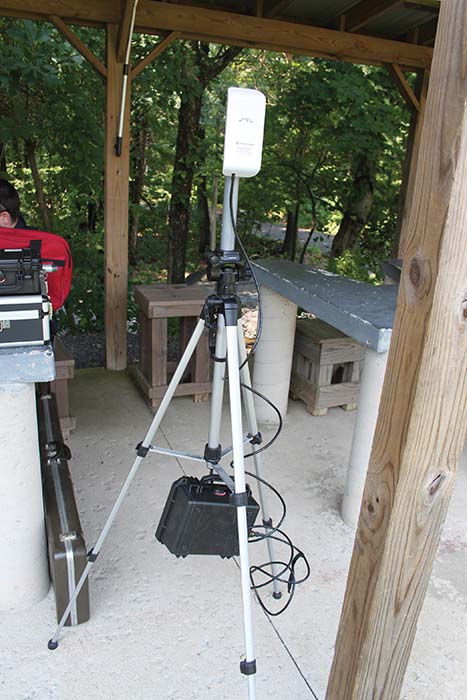
Overall, the Oakwood Controls target systems, specifically the H-Bar experienced first hand for this article, are enhancers of the shooting experience. Anyone committed to honing their long range rifle skills will appreciate and benefit from the opportunity to train with one. With a price of $5,500 the H-Bar is much more obtainable by individual consumers. The ability to get instant feedback by merely shifting your vision to a computer screen after a fired shot while conditions are still fresh in your mind is invaluable. Oakwood Controls’ electronic target systems are a model of ingenuity and an individual’s drive to make something happen despite being told not practical.
| This article first appeared in Small Arms Review V21N3 (April 2017) |



